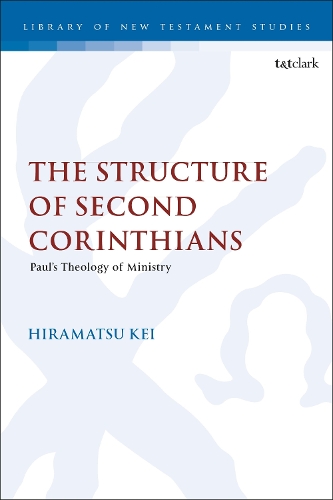
The Structure of Second Corinthians: Pauls Theology of Ministry
(Paperback)
Available Formats
Publishing Details
The Structure of Second Corinthians: Pauls Theology of Ministry
By (Author) Dr Kei Hiramatsu
Bloomsbury Publishing PLC
T.& T.Clark Ltd
24th April 2025
United Kingdom
Classifications
Tertiary Education
Non Fiction
Theology
New Testaments
Criticism and exegesis of sacred texts
227.306
Physical Properties
Paperback
264
Width 154mm, Height 232mm, Spine 20mm
400g
Description
Hiramatsu Kei examines the literary structure of 2 Corinthians and how it can illuminate understanding of this Pauline letter and its theological message. He explores the theoretical foundations of Inductive Bible Study as an approach, which focuses on the meaning of biblical texts in their final form by incorporating insights from multifarious methodologies. Based on the final form of the letter and its compositional unity, he prioritizes the literary context as consequential evidence for interpretation. Hiramatsu argues that there are two major components of the literary structure: the division of the letter and the identification of major structural relationships within and between the divided parts. Thus, he proposes that 2 Corinthians consists of seven major segments which coherently develop Pauls discourse pertaining to ministry, and discusses the implications regarding his theology of theocentric ministry and that of weakness that arise from a literary investigation. Hiramatsu demonstrates that an inductive and integrative approach not only presents a more suitable and helpful literary structure for 2 Corinthians, but also illustrates the relevance of such study when seeking to gain understanding of the theological implications of the letter.
Reviews
Reading 2 Corinthians is no easy task. What is the shape of Pauls argument What can account for the major structural developments in the text Turning to scholarship for answers is a bewildering experience as there are as many solutions to these questions as there are scholars of 2 Corinthians. Of course, the various partition theories, chronologies of Paul and his letters, and historical-critical reading strategies complicate matters further. What is needed is an integrated approach that doesnt lose sight of the wood for the trees, one that is conversant with the major scholarly issues and can advance a thesis with methodological clarity. Thankfully, into these choppy waters now wades Kei Hiramatsu with a set of elegant and sophisticated proposals to account for the shape of 2 Corinthians as a whole. He is conversant with the insights of topical, epistolary, rhetorical, literary, and discourse analytical findings, but moves beyond them all by employing an inductive and integrated methodology. The result is a compelling account of the major structural relations of the letter as a whole, both in broad sweep and in detail. Hiramatsus structural analysis and methodology also offer him opportunity to present fresh perspectives on the theology of 2 Corinthians. It is, therefore, a delight that this learned and important work is now available to the wider academic community. Simply put, any future scholarly engagement with 2 Corinthians will need to tackle Hiramatsus scholarship. * Chris Tilling, St Mellitus College, UK *
Author Bio
Hiramatsu Kei is New Testament Faculty at Central Bible College, Japan. He has presented and published articles on Pauline letters, especially on the Corinthian Correspondence. He is the first Langham Scholar from Japan.
